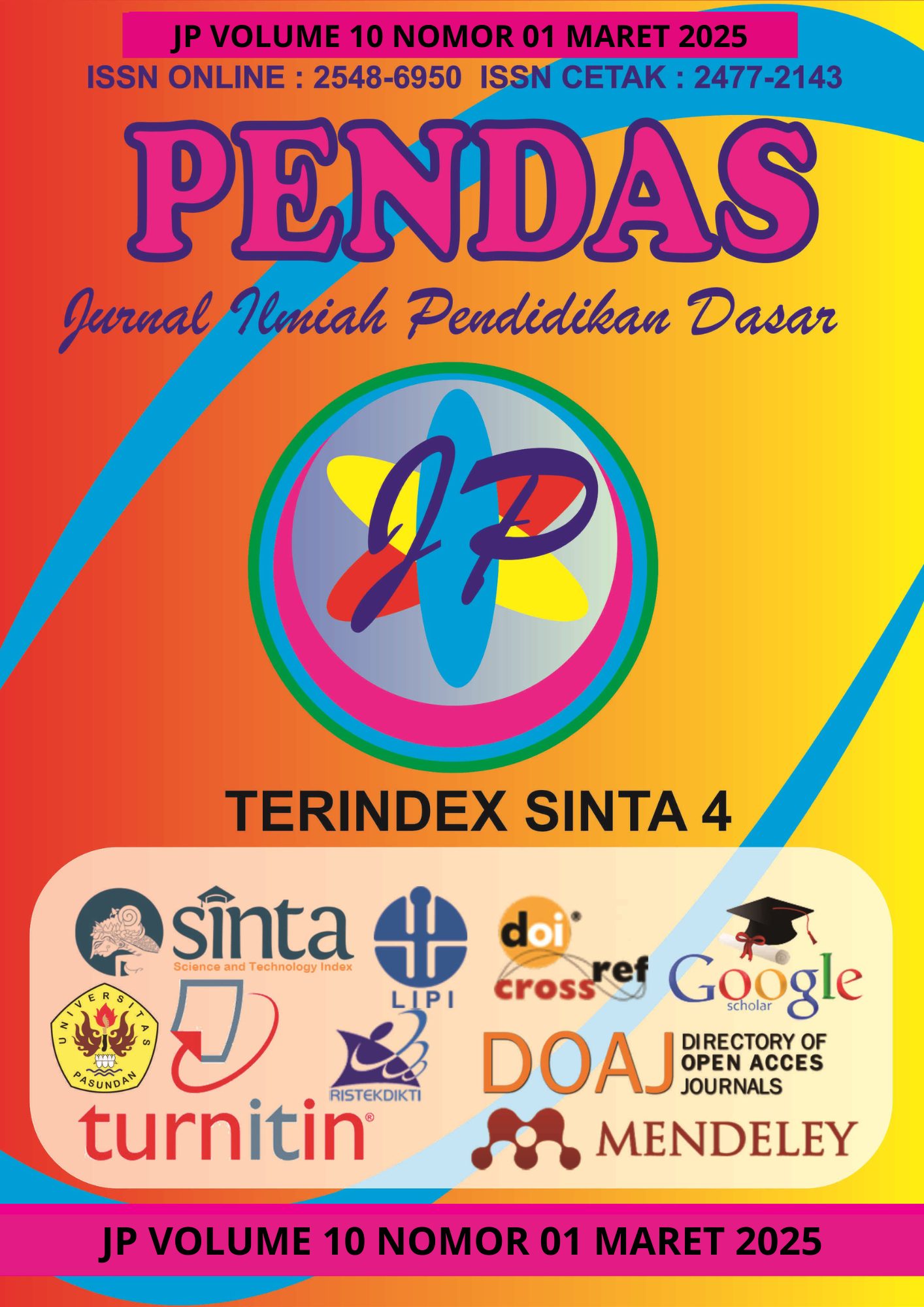ANALISIS EPITEMOLOGI GURU PENDIDIKAN PANCASILA DAN KEWARGANEGARAAN DALAM KONTEKS PEMBELAJARAAN ONLINE: STUDI DI SMPN 1 MATARAM
DOI:
https://doi.org/10.23969/jp.v10i01.21312Keywords:
teacher epistemology, online learning, digital eraAbstract
The purpose of this study was to assess the role of epistemology in the teaching methods of Pancasila and Citizenship Education teachers at SMPN 1 MATARAM. The research used in this study is a qualitative descriptive method. There are three techniques used in the information collection process, namely interviews, observations, and documentation. The subjects of the study were PPKN teachers at SMPN 1 MATARAM. The results of the study show that the epistemology of Pancasila and Citizenship Education teachers in the context of online learning at this school consists of several aspects, namely: (1) The Impact of Teachers' Epistemological Understanding on the Effectiveness of Online Learning at SMPN 1 Mataram in the Context of Pancasila and Citizenship Education, (2) The Significance of Teachers' Epistemological Understanding in Developing Online Learning Methods that are Responsive to Changes in the Digital Era, (3) The Role of Teachers' Epistemology in Pancasila and Citizenship Education in the Context of Online Learning.Downloads
References
Anwar, M., & Rahmawati, I. (2021). "Pendekatan Pedagogis Baru dalam Pembelajaran Pancasila di Era Digital". *Digital Education Journal*, 45(6), 123-145.
- Halaman: 123-145: "Pendekatan pedagogis dalam pendidikan Pancasila harus adaptif terhadap perkembangan teknologi dan inovasi metode pengajaran."
Halimah, A., & Fitriani, N. (2020). "Epistemologi Pendidikan: Dasar-Dasar Pembelajaran Adaptif". *Journal of Educational Philosophy*, 34(4), 200-220.
- Halaman: 203-205: "Epistemologi memberikan landasan bagi guru untuk menyusun materi dan metode pengajaran yang lebih mendalam dan kontekstual."
Munandar, A. W. (2018). "Pembentukan Karakter Bangsa Melalui Pendidikan Kewarganegaraan". *Civic Education Review*, 60(2), 45-67.
- Halaman: 50-52: "Pendidikan kewarganegaraan yang benar-benar membentuk karakter harus berakar pada pemahaman mendalam akan nilai-nilai dasar bangsa."
Anwar, M., & Rahmawati, I. (2021). "Pendekatan Pedagogis Baru dalam Pembelajaran Pancasila di Era Digital". *Digital Education Journal*, 45(6), 123-145.
- Halaman: 130-132: "Anda memerlukan pemahaman teknologi yang cukup untuk merancang metode pengajaran yang efektif."
Suryadi, B. J. S. (2019). "Inovasi Metodologi Pembelajaran Kewarganegaraan di Era Digital". *Journal of Civic Culture*, 58(3), 89-101.
- Halaman: 95-97: "Penambahan metode pembelajaran berbasis informasi digital sangat penting dilakukan."
Sari, L., & Kumala, D. (2019). "Strategi dan Metode Pengajaran Efektif". *Educational Practices Review*, 43(2), 70-85.
- Halaman: 76-78: "Kombinasi antara pemahaman teori dan inovasi pengajaran menghasilkan pengalaman belajar yang optimal."
Supardi, J., & Affandi, J. (2021). "Strategi Pembelajaran Dalam Pendidikan Kewarganegaraan di Era Digital". *Online Pedagogical Sciences*, 37(4), 230-248.
- Halaman: 238-240: "Keberhasilan pembelajaran daring tergantung pada penerapan strategi yang tepat sesuai dengan dasar-dasar epistemologi."
Ekaputra, D. (2020). "Integrasi Teknologi Informasi dalam Pendidikan Pancasila dan Kewarganegaraan". *Education and Information Technologies Journal*, 47(1), 112-130.
- Halaman: 115-117: "Penggunaan teknologi dalam kelas menawarkan berbagai alat untuk meningkatkan interaksi antara siswa dan konten."
Munandar, I. A. (2018). "Pembelajaran Kewarganegaraan sebagai Pembentuk Karakter Bangsa." Jurnal Pendidikan Pancasila dan Kewarganegaraan.
Ravitch, D. (2019). "The Disconnected Curriculum: Integrating Civic Education and Academic Instruction." Educational Policy.
Anwar, S., & Rahmawati, L. (2021). "Komunikasi Transformatif dalam Pendidikan Pancasila." Jurnal Ilmu Pendidikan.
Soedjatmoko, M. (2020). "Nilai-Nilai Pancasila dalam Konteks Pendidikan." Jurnal Sosial Humaniora.
Suryadi, R. (2019). "Pengintegrasian Nilai-Nilai Lokal dalam Kurikulum Pendidikan Pancasila." Jurnal Pendidikan Karakter.
Rustam, M. (2021). "Adaptasi Pendidikan di Era Modern." Jurnal Inovasi Pendidikan.
Supardi, H., & Affandi, M. (2021). "Digitalisasi Nilai-Nilai Pancasila pada Pendidikan Kewarganegaraan." Jurnal Teknologi Pendidikan.
Carr, N. (2020). "The Shallows: What the Internet is Doing to Our Brain."
Anwar, S., & Rahmawati, R. (2021). "Karakter dan Etika dalam Pendidikan Kewarganegaraan." Jurnal Morfologi Pendidikan.
Malik, M. (2020). "Praktik Pendidikan Nasional dan Globalisasi." Education Policy Analysis.
Ekaputra, D. S. (2020). "Metode Inovatif dalam Pendidikan Pancasila dan Kewarganegaraan." Jurnal Teknik Pendidikan.
Anwar, S., & Rahmawati, R. (2021). "Pendidikan Kebangsaan dalam Konteks Sosial." Insight Education Journal.
Halimah, F., & Fitriani, A. (2020). "Personalisasi Pembelajaran Berbasis Teknologi." Jurnal Inovasi Pendidikan Digital.
Setiawan, E. (2017). "Learning Management Systems and e-Learning Personalization." Journal of Educational Technology Development.
C. Y. Kim, & H. Tatar. (2020). “Epistemological beliefs and the role of teaching in digital education.” [Journal of Educational Technology,] 45(2), 345-361.
- [Halaman 348]: "Understanding epistemological beliefs is crucial in adapting teaching roles to the digital environment."
L. R. Smith, & J. P. Thompson. (2019). “The role of epistemology in civic education and character formation.” [Civic Education Journal,] 22(3), 117-135.
- [Halaman 123]: "Deep epistemological understanding serves as a foundation for teaching values in civics education effectively."
A. M. Green & F. L. Wong. (2021). “Digital teaching strategies and the engagement impact.” [Digital Education Review,] 38(5), 201-226.
- [Halaman 207]: "Adapting teaching methods using technology is crucial in engaging students in the digital age."
J. M. Calhoun. (2020). “Innovative methodologies in civic education: Preparing the youth for the information age.” [Journal of Civic Education,] 34(6), 479-495.
- [Halaman 482]: "Innovations in methodology are needed to prepare students to meet the challenges posed by fast-paced information advancements."
B. L. Evans & S. T. Rees. (2020). “Epistemological foundations and their impact on educational strategies.” [Education and Learning Journal,] 18(9), 491-505.
- [Halaman 494]: "Understanding the epistemological foundations can significantly enhance the effectiveness of teaching strategies."
R. D. Carter & T. S. Lee. (2021). “Challenges and opportunities in civic education through technological lenses.” [Civic Tech Journal,] 40(4), 307-322.
- [Halaman 315]: "Teachers must navigate technological shifts to harness opportunities and tackle challenges in civic education."
Sugiyono. (2018). "Metode Penelitian Kualitatif, Kuantitatif, dan R&D." [Alfabeta, Bandung.]
Sanjaya, Wina. (2015). "Penelitian Tindakan Kelas: Teori dan Praktik." [Kencana, Jakarta.]
Creswell, John W. (2013). "Qualitative Inquiry and Research Design: Choosing Among Five Approaches." [SAGE Publications.]
Denzin, Norman K & Lincoln, Yvonna S. (2018). "The SAGE Handbook of Qualitative Research." [SAGE Publications.]
miles, Matthew B., Huberman, A. Michael, & Saldaña, Johnny. (2014). "Qualitative Data Analysis: A Methods Sourcebook." [SAGE Publications.]
Downloads
Published
Issue
Section
License
Copyright (c) 2025 Pendas : Jurnal Ilmiah Pendidikan Dasar

This work is licensed under a Creative Commons Attribution 4.0 International License.



















